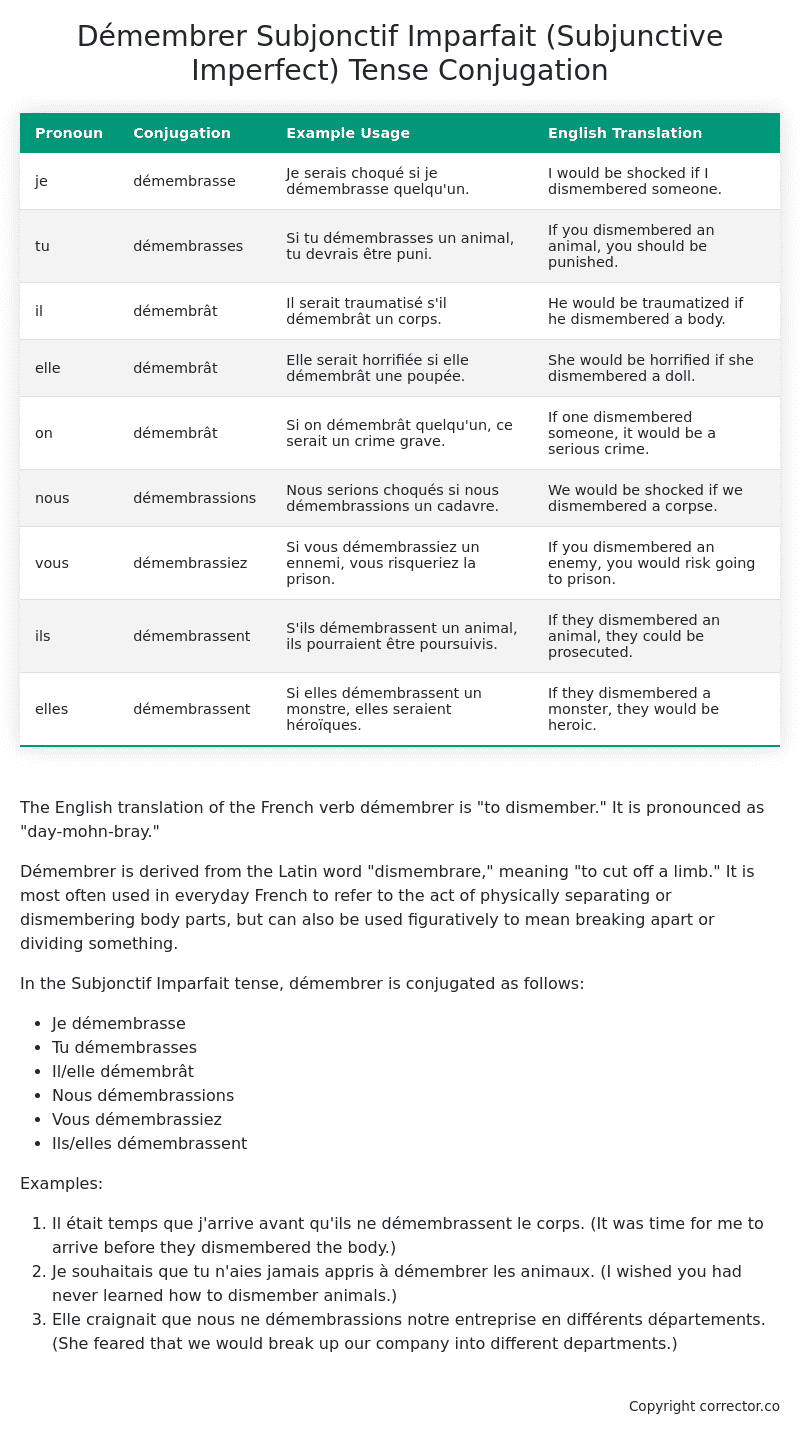Subjonctif Imparfait (Subjunctive Imperfect) Tense Conjugation of the French Verb démembrer
Introduction to the verb démembrer
The English translation of the French verb démembrer is “to dismember.” It is pronounced as “day-mohn-bray.”
Démembrer is derived from the Latin word “dismembrare,” meaning “to cut off a limb.” It is most often used in everyday French to refer to the act of physically separating or dismembering body parts, but can also be used figuratively to mean breaking apart or dividing something.
In the Subjonctif Imparfait tense, démembrer is conjugated as follows:
- Je démembrasse
- Tu démembrasses
- Il/elle démembrât
- Nous démembrassions
- Vous démembrassiez
- Ils/elles démembrassent
Examples:
- Il était temps que j’arrive avant qu’ils ne démembrassent le corps. (It was time for me to arrive before they dismembered the body.)
- Je souhaitais que tu n’aies jamais appris à démembrer les animaux. (I wished you had never learned how to dismember animals.)
- Elle craignait que nous ne démembrassions notre entreprise en différents départements. (She feared that we would break up our company into different departments.)
Table of the Subjonctif Imparfait (Subjunctive Imperfect) Tense Conjugation of démembrer
| Pronoun | Conjugation | Example Usage | English Translation |
|---|---|---|---|
| je | démembrasse | Je serais choqué si je démembrasse quelqu’un. | I would be shocked if I dismembered someone. |
| tu | démembrasses | Si tu démembrasses un animal, tu devrais être puni. | If you dismembered an animal, you should be punished. |
| il | démembrât | Il serait traumatisé s’il démembrât un corps. | He would be traumatized if he dismembered a body. |
| elle | démembrât | Elle serait horrifiée si elle démembrât une poupée. | She would be horrified if she dismembered a doll. |
| on | démembrât | Si on démembrât quelqu’un, ce serait un crime grave. | If one dismembered someone, it would be a serious crime. |
| nous | démembrassions | Nous serions choqués si nous démembrassions un cadavre. | We would be shocked if we dismembered a corpse. |
| vous | démembrassiez | Si vous démembrassiez un ennemi, vous risqueriez la prison. | If you dismembered an enemy, you would risk going to prison. |
| ils | démembrassent | S’ils démembrassent un animal, ils pourraient être poursuivis. | If they dismembered an animal, they could be prosecuted. |
| elles | démembrassent | Si elles démembrassent un monstre, elles seraient héroïques. | If they dismembered a monster, they would be heroic. |
Other Conjugations for Démembrer.
Le Present (Present Tense) Conjugation of the French Verb démembrer
Imparfait (Imperfect) Tense Conjugation of the French Verb démembrer
Passé Simple (Simple Past) Tense Conjugation of the French Verb démembrer
Passé Composé (Present Perfect) Tense Conjugation of the French Verb démembrer
Futur Simple (Simple Future) Tense Conjugation of the French Verb démembrer
Futur Proche (Near Future) Tense Conjugation of the French Verb démembrer
Plus-que-parfait (Pluperfect) Tense Conjugation of the French Verb démembrer
Passé Antérieur (Past Anterior) Tense Conjugation of the French Verb démembrer
Futur Antérieur (Future Anterior) Tense Conjugation of the French Verb démembrer
Subjonctif Présent (Subjunctive Present) Tense Conjugation of the French Verb démembrer
Subjonctif Passé (Subjunctive Past) Tense Conjugation of the French Verb démembrer
Subjonctif Imparfait (Subjunctive Imperfect) Tense Conjugation of the French Verb démembrer (this article)
Subjonctif Plus-que-parfait (Subjunctive Pluperfect) Tense Conjugation of the French Verb démembrer
Conditionnel Présent (Conditional Present) Tense Conjugation of the French Verb démembrer
Conditionnel Passé (Conditional Past) Tense Conjugation of the French Verb démembrer
L’impératif Présent (Imperative Present) Tense Conjugation of the French Verb démembrer
L’infinitif Présent (Infinitive Present) Tense Conjugation of the French Verb démembrer
Struggling with French verbs or the language in general? Why not use our free French Grammar Checker – no registration required!
Get a FREE Download Study Sheet of this Conjugation 🔥
Simply right click the image below, click “save image” and get your free reference for the démembrer Subjonctif Imparfait tense conjugation!

Démembrer – About the French Subjonctif Imparfait (Subjunctive Imperfect) Tense
Formation
Common Everyday Usage Patterns
Interactions with Other Tenses
Subjonctif Présent
Indicatif Passé Composé
Conditional
Conditional Perfect
Summary
I hope you enjoyed this article on the verb démembrer. Still in a learning mood? Check out another TOTALLY random French verb conjugation!


